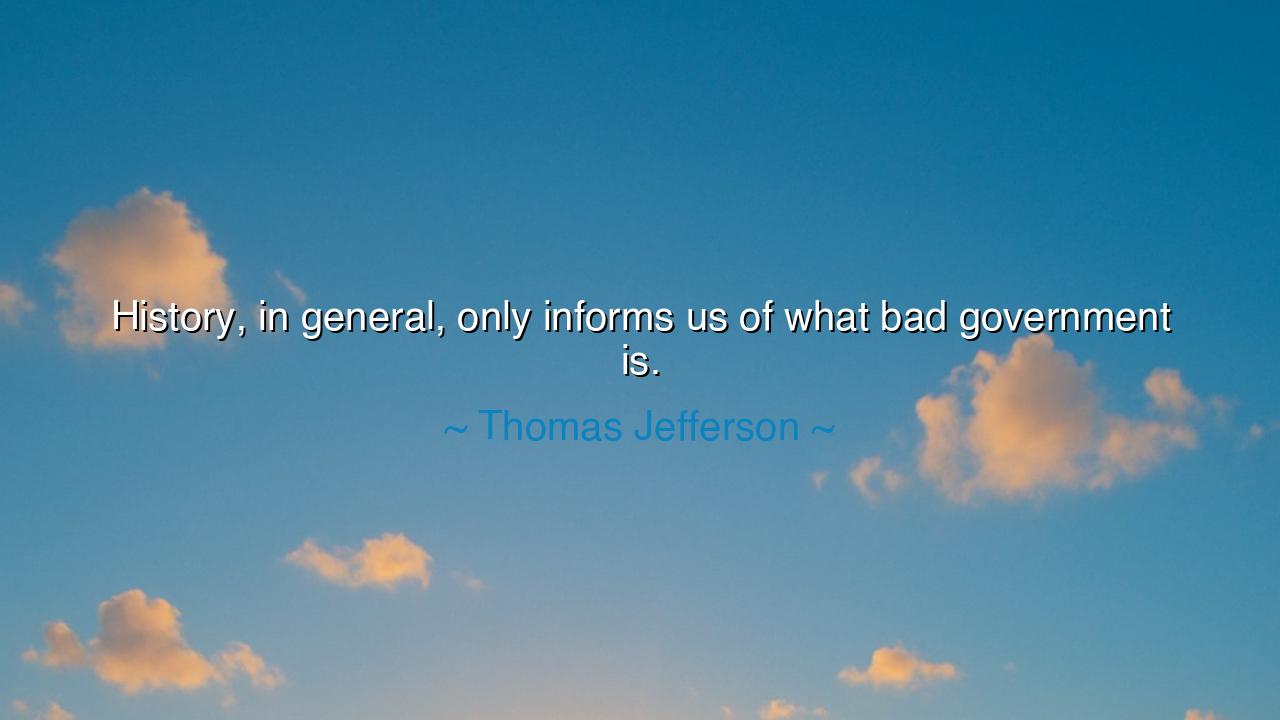
History, in general, only informs us of what bad government is.






"History, in general, only informs us of what bad government is." Thus spoke Thomas Jefferson, the sage of liberty, whose mind was both the architect of freedom and the guardian of its lessons. In this solemn reflection, Jefferson did not scorn history—he revered it—but he saw in its vast pages a recurring tragedy: that the chronicles of men are written more in chains than in liberty, more in tyranny than in justice. His words remind us that history, though glorious in moments, is too often a scroll of sorrow, a witness to the arrogance of power and the complacency of the governed.
From the dawn of civilization, empires have risen like suns only to set in ruin, leaving behind a single truth: that bad government is the oldest affliction of humankind. The annals of Egypt, Greece, Rome, and countless kingdoms after them resound with tales of rulers who forgot the people and served only themselves. Pharaohs built monuments while their subjects starved. Caesars proclaimed peace while spilling rivers of blood. Kings, draped in divine right, crushed the spirit of their own kin. And through each age, history—faithful and unflinching—has borne witness to their folly. Jefferson, who studied these records with the eyes of both philosopher and patriot, saw the pattern: when power grows unchecked, the freedom of the people withers like grass beneath the sun.
Consider the story of Rome, that mighty empire which once shone as the world’s heart of law and order. In its infancy, Rome was a republic—a union of citizens who believed that no man should rule without consent. But as her dominion expanded, so too did her hunger for control. Senators became corrupt, generals became tyrants, and emperors claimed the mantle of gods. Bread and circuses lulled the people into silence, while liberty perished in the shadows. The collapse of Rome was not sudden; it was the slow decay of virtue beneath the weight of excess. And thus, her story became one of countless testaments to Jefferson’s truth: that history tells us more of what to avoid than what to imitate.
Jefferson’s words also carry a warning that pierces the modern heart. For even in times of progress and enlightenment, mankind forgets easily. The lessons of bad government are learned again and again, as if written on water. When citizens grow apathetic, when leaders grow arrogant, when laws serve the few instead of the many, the same ancient pattern begins anew. Jefferson knew that the great enemy of freedom is not invasion, but forgetfulness—the quiet erosion of vigilance in the hearts of the people.
Yet, his message is not despair, but awakening. If history is a record of failure, then it is also a teacher—a merciless but invaluable one. To read history rightly is to see not only what went wrong, but why it went wrong, and to guard against it. Jefferson, a craftsman of the American Republic, believed that men could learn from the wreckage of the past to build something nobler. “Eternal vigilance is the price of liberty,” his age declared, and so the study of history becomes not mere memory, but defense—the shield of the free.
Let us recall, too, that in Jefferson’s own time, the wounds of bad governance were still fresh. He and his companions had witnessed the tyranny of kings across the ocean, the arrogance of an empire that taxed without representation and ruled without mercy. The American Revolution was not born from ambition, but from the memory of oppression. In overthrowing that rule, they sought not to destroy government, but to redeem it—to prove that power could serve the people rather than enslave them. Jefferson’s insight, then, was forged in the fires of experience: that the wisdom of liberty must grow from the ruins of tyranny.
The lesson, therefore, stands clear across the ages: do not trust blindly in those who govern, but hold them to the light of justice and reason. Let every citizen be a student of history, for in its pages lie both the warnings and the weapons of freedom. Question authority, cherish truth, and remember that government is righteous only when it serves the governed. When it forgets this, it becomes the very evil it was meant to prevent.
So, O children of the future, hear this ancient wisdom: learn from history, but do not repeat it. Let every generation write new chapters not of oppression, but of enlightenment. For the story of mankind need not always tell of bad government. It can, if we will it, become the chronicle of just rule—of leaders guided by conscience, and of people awakened by knowledge. Then at last, the lesson Jefferson spoke will not remain a lament, but a victory long awaited in the soul of the world.






AAdministratorAdministrator
Welcome, honored guests. Please leave a comment, we will respond soon